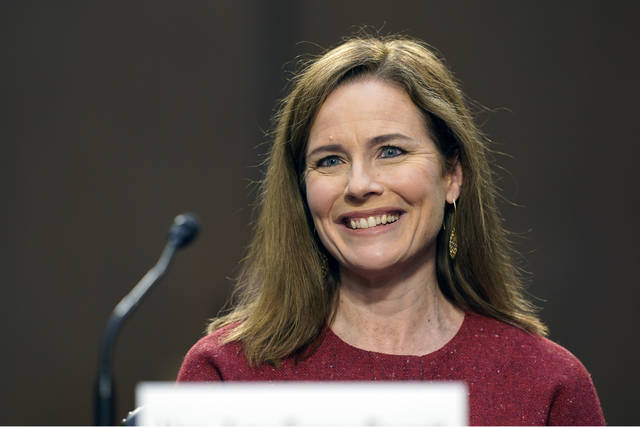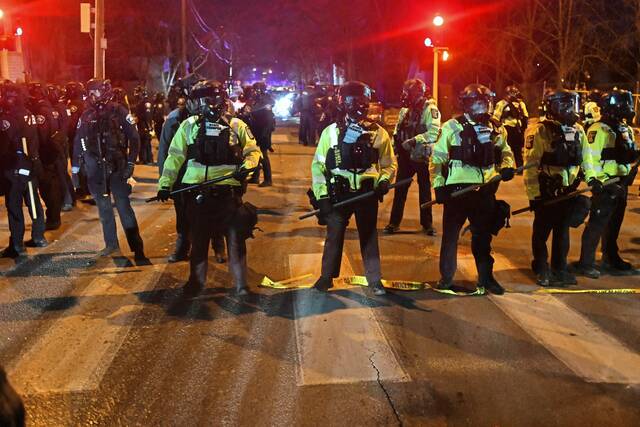After the Senate’s hearing to confirm Judge Amy Coney Barrett to the Supreme Court, the timing of her nomination — just a week and a day after the death of Justice Ruth Bader Ginsburg, and weeks before a presidential election — has enraged Democrats in Congress and many Democratic voters.
While they may be deeply offended by President Trump and the Republicans’ brute-force power play, especially given how the GOP thwarted President Obama’s nominee, Judge Merrick Garland, in 2016, they also may come to appreciate the timing in hindsight.
To be sure, Democrats will likely be agonized for years to come over Barrett’s seemingly inevitable appointment to the high court — Trump’s third in just one very consequential term. She could give conservatives a 6-3 majority on the court, and for a very long time.
But what if, in the shorter term, it turns out to have helped send Trump packing from the White House?
Instead of dangling the prospect of a third Supreme Court appointment, Trump gave it away for free before an election in which he is not assured a victory. In fact, Joe Biden is polling better against the incumbent than any challenger has since 1936.
If Trump’s “very stable genius” were made up of more than just fumbling swipes at immediate gratification, he would have withheld the nomination, and opened every rally from the day Ginsburg passed until the election promising to deliver a third justice only when and if he is re-elected.
He would have threatened that without his reelection, Democrats would appoint a “far-left, socialist radical” who’d “destroy American life as they know it.” He would have used it to instill the kind of cartoonish, apocalyptic fear (of seemingly everything but a deadly global pandemic) that has defined much of his presidency.
Instead, there’s little if any drama or urgency surrounding the Barrett pick. She’s practically assured a confirmation, with nothing Democrats can do to stop it.
That’s not a great scenario for the only thing that matters in a presidential election: turnout. Remember turnout?
Trump seems almost resigned to the fact that he will likely lose the popular vote to Biden. But he might be holding out for another split with the Electoral College, the kind that delivered a victory in 2016.
A month before the 2018 midterm elections, Brett Kavanaugh was confirmed to the Supreme Court after weeks of contentious hearings and investigations, the likes of which we probably won’t see in Barrett’s case.
Republicans promised Kavanaugh’s nomination and Democrats’ attacks on the judge would lead to a “Kavanaugh Effect” in the coming midterms. Senate Judiciary Committee member Lindsey Graham said “the ‘Kavanaugh Effect’ should actually be called ‘Kavanaugh’s Revenge’ ” for the havoc it would wreak on Democrats.
And yet, “Kavanaugh’s Revenge” would have made a better pirate ride at Disneyland than it did a Republican revolution. In sum, Democrats took control of the House with the largest midterm margin of victory in history, and five Democratic senators in states Trump won in 2016 won their reelections. Another beat a Republican to pick up a Senate seat.
It turned out Democrats, according to polls taken before the midterms, were more energized by the nomination battle than Republicans. Enthusiasm among Democrats surged — 77% said they were “very motivated” to turn out and vote in the midterms — compared to 68% of Republicans.
And exit polls showed that nationally, more voters opposed Kavanaugh’s nomination than supported it. The numbers were especially stark among women.
If Barrett has a similar effect on turnout — mobilizing more Democrats than Republicans — that’s even math that Trump can do, and it isn’t good for Trump.
He needs every vote he can get. And in ramming this nomination through weeks before the election, he might have taken away one of the last real things he could have promised. That would be quite the unforced error.








